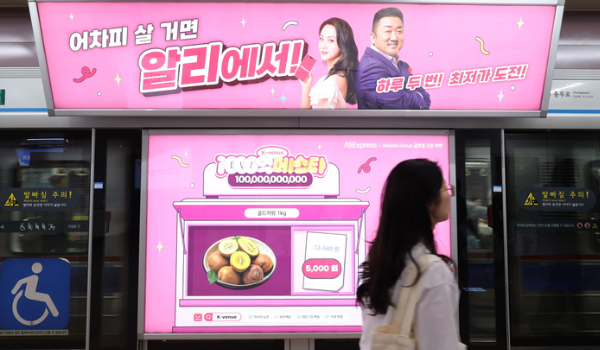![[Photo by Lee Chung-woo]](https://file.mk.co.kr/meet/neds/2024/04/image_readtop_2024_302369_17139239205934375.jpg)
[Photo by Lee Chung-woo]
Chinese e-commerce platforms AliExpress and Tem have sold a combined 3 trillion won ($2.2 billion) worth of goods in South Korea over the past year, and are gaining traction among domestic rivals. There is growing concern that
AliExpress, Temu and other major Chinese cross-border e-commerce platforms have increased their total transactions in South Korea from April 1, 2023 to March 31, 2024, according to data from mobile app analysis service Wiseapp Retail Goods on Tuesday. The sales price reached 2.92 trillion won. .
This number is based solely on consumer payment records, including credit cards, debit cards, and other forms of consumer payments.
Including corporate card transactions, business-to-business transactions, and payments through mobile payment platforms, the total transaction amount is estimated to exceed 3 trillion won.
Since AliExpress has strengthened its efforts targeting the Korean market, including appointing actor Ma Dong-seok as a brand ambassador in March 2023, transaction volume has been rapidly increasing.
During Singles' Day, China's largest shopping festival held in November last year, the monthly transaction amount exceeded 400 billion won.
The transaction amount in the first quarter was 819.6 billion won, an increase of 160% compared to the same period last year.
Temu, which entered the Korean market in August last year, is also showing significant growth.
When the service first started in South Korea, the monthly transaction amount was 1 billion won, but by the end of last year it had reached nearly 20 billion won. Last month's transaction amount was approximately 46.3 billion won, more than double the previous month.
Shein and TikTok Shop, another Chinese e-commerce company known for low-priced fashion items, are also ramping up efforts to expand their presence in South Korea.
These platforms are now targeting the relatively unregulated South Korean market, as regulations on Chinese e-commerce have tightened in the United States and Europe.
TikTok Korea, the Korean subsidiary of Chinese social media platform TikTok, applied for a trademark for TikTok Shop in South Korea in December last year.
Recently, TikTok announced plans to hire more than 40 employees in South Korea for sales, business development, advertising, and e-commerce partnerships.
TikTok Shop is a live commerce platform that combines video and shopping, allowing users to instantly purchase products seen in videos.
Despite being relatively new, it is gaining popularity around the world.
Since entering the US market last September, TikTok Shop's gross merchandise volume (GMV) has exceeded $11 billion in just three months.
In the U.S., 37.5% of TikTok users, or 55.5 million people, have purchased products from TikTok shops, according to business analytics firm Fit Small Business.
![[Graphics by Song Ji-yoon and Minu Kim]](https://file.mk.co.kr/meet/neds/2024/04/image_readmed_2024_302369_17139239205934376.jpg) Home
Home[Graphics by Song Ji-yoon and Minu Kim]
In the retail industry, there are growing concerns that the combined power of AliExpress, Temu, Shein, and TikTok Shop, backed by abundant financial resources from the Chinese domestic market, could dominate South Korea's e-commerce market within a few years. ing.
As of March, AliExpress had 8.87 million monthly active users in South Korea, and Temu had 8.29 million users. Combined with his 680,000 users on Shein, it reaches a total of 17.84 million users, or almost 60% of the 30.86 million users on his Coupang, South Korea's leading shopping app.
Industry insiders predicted that AliExpress, Temu, Shein, and TikTok Shop combined have more than 30 million users and could approach 40 million by the end of this year.
However, what is concerning is the fact that AliExpress, Temu, Shein, and TikTok Shop have not yet invested sufficiently in South Korea.
If they step up their investment, both their user base and trading volume are likely to explode.
Compared to Korean e-commerce brands such as 11Street and Gmarket, which have already been overtaken by Chinese companies, these Chinese platforms have superior financial strength and revenue.
TikTok's parent company ByteDance posted revenue of $120 billion last year, a 40% increase over the previous year, and net profit of $40 billion.
Despite having emerged as the number one company in the Korean retail industry with sales exceeding 30 trillion won last year, Coupang's sales of 31.82 trillion won and operating profit of 617.4 billion won are significantly lower than its Chinese competitors. small.
Coupang's cumulative losses at the end of last year reached 6 trillion won.
Choi Jae Won, Park Chan Young, Min Woo Kim
[ⓒ Pulse by Maeil Business News Korea & mk.co.kr, All rights reserved]


